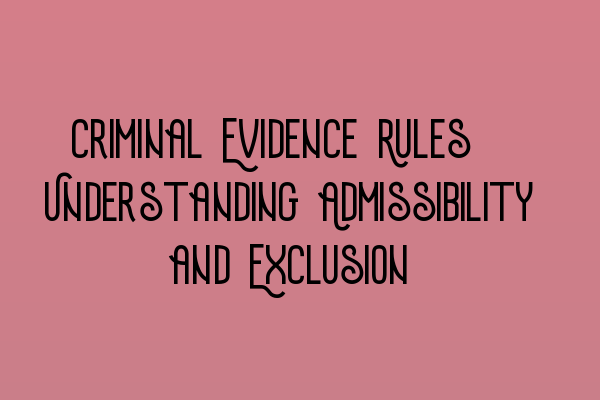Criminal Evidence Rules: Understanding Admissibility and Exclusion
As criminal defense solicitors at SQE Criminal Law & Practice Law UK, we understand the importance of evidence in any criminal trial. The admissibility of evidence plays a crucial role in determining the outcome of a case. This blog post aims to provide a comprehensive understanding of the rules surrounding the admissibility and exclusion of criminal evidence.
What is Admissibility of Evidence?
The admissibility of evidence refers to whether evidence is allowed to be presented in court during a trial. The rules governing the admissibility of evidence are complex and often subject to interpretation. It is the responsibility of the defense solicitor to argue for the exclusion of prejudicial or unreliable evidence, while the prosecution will seek to establish its relevance and reliability.
There are several factors that affect the admissibility of evidence, including:
- The relevance of the evidence to the issue at hand
- The reliability and credibility of the evidence
- The probative value of the evidence
- The manner in which the evidence was obtained
- Respecting the defendant’s rights and ensuring fairness of the trial
Understanding these factors is crucial in building an effective defense strategy and ensuring that only admissible evidence is presented in court.
Exclusionary Rules
Exclusionary rules are in place to prevent the admission of certain types of evidence that would be unfair or prejudicial to the defendant. These rules aim to protect the rights of the accused and ensure a fair trial. Some common exclusionary rules include:
- The Rule against Hearsay
- The Rule against Opinion Evidence
- Illegal Search and Seizure
- Inadmissible Character Evidence
The Rule against Hearsay, for example, prohibits the use of out-of-court statements offered for the truth of the matter asserted. Opinion evidence, unless provided by an expert witness, is generally not admissible as well.
Understanding these exclusionary rules is essential to challenge the admissibility of evidence that may be prejudicial or unreliable.
Challenging Admissibility
As defense solicitors, it is our duty to challenge the admissibility of evidence that is deemed inadmissible under the rules. This can be done through various legal avenues, such as filing a motion to suppress evidence or objecting to its admission during trial. By effectively challenging the admissibility of evidence, we strive to protect the rights of our clients and ensure a fair trial.
It is important to note that the admissibility of evidence can be a complex and nuanced area of law. For specific cases and advice, it is crucial to consult with an experienced criminal defense solicitor.
At SQE Criminal Law & Practice Law UK, we offer comprehensive preparation courses for the SQE 1 and SQE 2 exams. If you are studying for the SQE 1 exam, check out our SQE 1 Practice Exam Questions and SQE 1 Practice Mocks FLK1 FLK2. For SQE 2 preparation, we offer SQE 2 Preparation Courses. Stay updated with the latest SRA SQE Exam Dates on our website to plan your study schedule effectively.
Thank you for reading!
